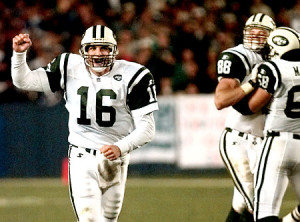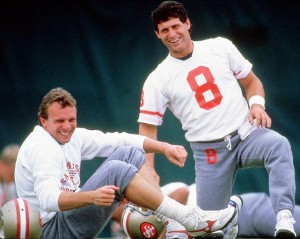by Chase Stuart
on July 24, 2014

Testaverde led the Jets to the AFCCG in 1998.
The 1998 season was one of my favorite years in NFL history. It was also a pretty weird one. We had Terrell Davis rushing for 2,000 yards, rookies Randy Moss and Fred Taylor making defenses look silly, and a quartet of old quarterbacks stun the football world. Doug Flutie came out of nowhere Canada to lead the Bills to a 7-3 record after being out of the NFL for nine years. Randall Cunningham, who had retired after the ’96 season, came off the bench in ’98 to produce one of the best backup seasons in NFL history. The other two quarterbacks are the stars of this post.
Vinny Testaverde had a very up-and-down career, although he was almost certainly a much better quarterback than you remember. Okay, Testaverde has lost more games than any other quarterback, but he played on some really bad teams throughout his career. Testaverde retired with a career winning percentage of 0.423. In 1998, he started 13 games for the Jets; based on that career winning percentage, we would have expected him to win 5.5 games in 1998. Instead, Testaverde went 12-1 in the regular season, giving him 6.5 more wins than we would expect. If that sounds remarkable to you, it should: that’s the 2nd largest discrepancy of any quarterback in NFL history in a single season (minimum 40 career wins). [continue reading…]
Tagged as:
wins
{ }
by Chase Stuart
on July 28, 2013
An interesting tweet from Adam Schefter today: Matt Ryan has 56 regular season wins in his first five seasons, the most in NFL history. Ryan has started 78 games, one of only three quarterbacks (Peyton Manning, Joe Flacco) to start at least 75 games in their first five seasons.
I thought it would be interesting to take a look at not just quarterback wins, but quarterback winning percentage (minimum: 15 wins) and wins minus losses (as a compromise between winning percentage and wins). As it turns out, Ryan ranks 1st in wins, 7th in winning percentage, and 1st in wins over losses (or wins over .500) among all quarterbacks to enter the league since 1960.
Of course, having a good (or bad) winning percentage early in a quarterback’s career doesn’t tell us how much of a “winner” that quarterback will be in the future.
Tagged as:
Matt Ryan,
QB Starts,
wins
{ }
by Chase Stuart
on July 18, 2013

The guy on the right was a loser until he wasn't.
Longtime readers of this blog know that I’m not a big fan of
Matt Stafford. Last year, when most people were praising his breakout 2011 season, I
questioned whether he was as good as his backers claimed. And, of course, his 2012 performance only raised more questions.
Stafford has a 17-28 career record, which in light of his recent contract extension, has caused people to criticize the Lions for giving big money to a player who is not a “winner.” There are legitimate reasons to criticize Stafford, so why would people fall back on statements like this? I’m sure Lions fans wish the team had won more games under Stafford, but that’s in the past. The real question — and the one faced by Lions management before giving him the extension — is whether his current career record has any predictive value when it comes to his future record.
Since 1960, there have been 77 quarterbacks who started at least 25 games in their first four seasons and then 25 more games in years five through eight. There’s some survivor bias in the sample — if you stick around for 25+ starts in years five through eight, you’re probably a pretty good quarterback — but there’s not much we can do about that. If you run a regression using winning percentage through four years as your input and winning percentage in years five through eight as your output, you get the following best-fit equation:
0.450 + 0.20 * Old Win %
The correlation coefficient is a tiny 0.04, and the p-value on the “Old Win %” variable is 0.09. Putting aside the questions of statistical significance, there is no practical effect. Stafford has a 0.377 winning percentage, which means this formula would predict him to win 52.6% of his games from 2013 to 2016. Joe Flacco won 68.75% of his games in his first four seasons; this would say he should be expected to win 58.7% of his games in years five through eight. In other words, someone with a great winning percentage should be expected to win only one more game per season than someone with a terrible winning percentage. And that’s even assuming the results are statistically significant, which many would say they are not.
[continue reading…]
Tagged as:
Lions,
Matt Stafford,
wins
{ }
by Chase Stuart
on October 27, 2012
Good stat today by ESPN’s Adam Schefter, who notes that Kansas City has gone 25 years without winning a game with a quarterback drafted by the Chiefs. This Todd Blackledge-led victory over the Chargers in 1987 was the last time a quarterback drafted by the Chiefs won a game in red and gold.
That’s remarkable, but as always, we need context. The table below looks at all team wins from 1988 to 2012 and shows how many games were won by a quarterback drafted by that team. Note: For purposes of this post, I’m considering John Elway, Jim Everett, Kelly Stouffer, Eli Manning, and Philip Rivers as having been drafted by the Broncos, Rams, Seahawks, Giants, and Chargers, respectively. Additionally, quarterbacks drafted before 1988 count, but only their wins starting in 1988 count for purposes of the table below. The last two columns show, for each, the quarterback with the most wins among those quarterbacks drafted and not drafted by that team.
As bad as the Chiefs record has been, the Saints record isn’t any better. In fact, since Archie Manning’s last game for the Saints, New Orleans has only drafted two quarterbacks – Dave Wilson and Danny Wuerffel – who have started and won a game for the team. JaMarcus Russell couldn’t even break the Raiders list, ending his career with seven wins. Two other interesting notes. Tony Romo is the only undrafted quarterback in the league currently starting. And of the 32 starting quarterbacks, three of them — Michael Vick, Matt Schaub, and Matt Ryan — were drafted by the Falcons.
Tagged as:
quarterbacks,
wins
{ }


